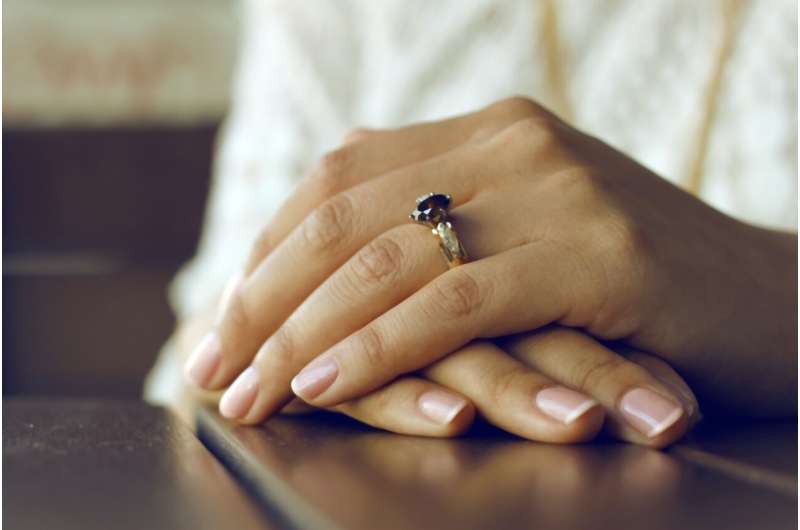This article has been reviewed according to Science X's editorial process and policies. Editors have highlighted the following attributes while ensuring the content's credibility:
fact-checked
trusted source
proofread
Research exposes impact of family courts on women's health

A study involving 45 women who accused their partners of domestic abuse has highlighted serious health problems they have suffered as a result, they say, of biased family court proceedings.
While the study is qualitative and self-reported and so not generalizable to the wider population, the women's experiences now indicate a need for further research.
Led by University of Manchester researchers in partnership with members of SHERA Research Group and The Survivor Family Network, the study of the women and their 77 children will be published in the Journal of Family Trauma, Child Custody and Child Development in the coming weeks.
The women told the researchers they attributed psychological conditions including suicide ideation, memory loss, depression and flash backs to what they were going through in court.
They also said physical symptoms such as Crohn's Disease, cancer, psoriasis, heart palpitations and miscarriage were either exacerbated by or directly associated with the court proceedings.
One respondent told how her mother had a heart attack in court and another how she lost her father to a heart attack also while proceedings were ongoing.
And a respondent told the research team how an acquaintance of hers had killed herself during court proceedings involving allegations of so-called "parental alienation."
The study also found:
- 43 out of the 45 parents, were given access to the children.
- One child had no contact after the parent accused of violence had abducted the child.
- In another case, the child reached an age deemed old enough to make their own choice.
- 43 out of 45 of the mothers' ex-partners had some form of contact with the children, even the ones with child sexual abuse convictions.
According to the researchers, 39 of the women accusing their former partners of abuse were counter accused of a spurious legal argument called parental alienation (PA)
PA was used, argue the team, as a way to deny the abuse and grant access or even residency of their children to the abusive parents.
The remaining six women who were not accused said they were either threatened with PA or mischaracterized as medically or psychologically abnormal.
PA, a belief system universally rejected by governments, the World Health Organization and other mainstream organizations, supposedly denotes psychological manipulation of a child to turn against his or her parent.
But research shows false allegations are rare and that it is extremely difficult to make a child make false allegations of child sexual abuse.
Though women who have suffered abuse are already highly vulnerable, lead researcher, Dr. Elizabeth Dalgarno says the courts tend to side with the male perpetrators by accepting PA.
The tendency for the courts to side with men, says Dr. Dalgarno, can be explained by lack of training for judges and court professionals around coercive control and domestic abuse and many believe, a culture of misogyny and woman and victim-blaming which is prevalent in society.
A recent government government inquiry also showed that the family courts often do not believe children when they report abuse.
And, adds Dr. Dalgarno, the evidence shows the Children and Family Court Advisory and Support Service (CAFCASS) accept PA, and may be too close to the father's rights lobby.
Dr. Dalgarno, who is a lecturer in public health at The University of Manchester and the Founder and Chair of SHERA Research Group said, "This is the first study to link family court proceedings with suicide ideation, suicide and mental and physical health problems in women who have been subjected to domestic abuse perpetrator behaviors.
"We believe that these conditions should be examined at scale in clinical research under the umbrella term that we have coined as court and perpetrator induced trauma (CPIT).
"The women we spoke to in our study provide a graphic depiction of the costs of parental alienation allegations—a pseudoscientific belief system designed to control women and deny abuse—to their psychological and physical health.
"The women are already traumatized, so it's not hard to imagine the impact of dealing with court proceedings which threaten to restore an abusive parent's access to their children because the courts don't believe them.
Dr. Dalgarno added, "Most abusers are not convicted most women don't even report to the police- this study is an important milestone in highlighting this problem.
"Though we can't generalize from this qualitative study, the findings acknowledge the structural disadvantage and intrinsic societal misogyny faced by women, providing transferable insights into the wider population of mothers.
"The system is loaded against abused women. Courts are often unsympathetic to them and the men's rights group families need fathers conference was recently attended by the Family Court president and CAFCASS representatives, but these organizations appear much less involved with mother-supporting groups like Women's Aid.
"It is known that around 49% to 62%of the 55,000 private family court cases each year involve domestic abuse.
"That is why we urgently need to know if these dreadful health impacts constitute a public health emergency—and that will require further research."
Questions over the dysfunctional nature of family court proceedings were publicized in the 2020 Harm Report by the Ministry of Justice.
The report accepted that PA is a tactic used by abusive fathers to deny abuse has occurred, though Home Office figures show only 2 to 5% of domestic abuse claims are false.
More information: Journal of Family Trauma, Child Custody and Child Development (2023)



















